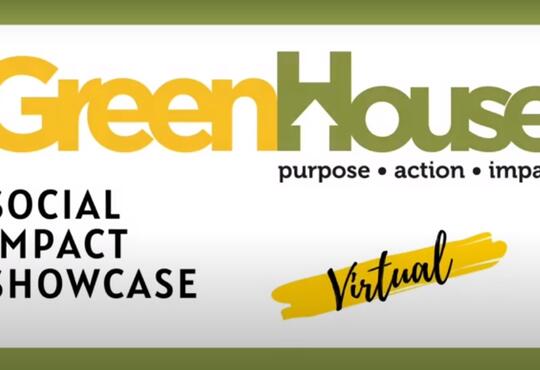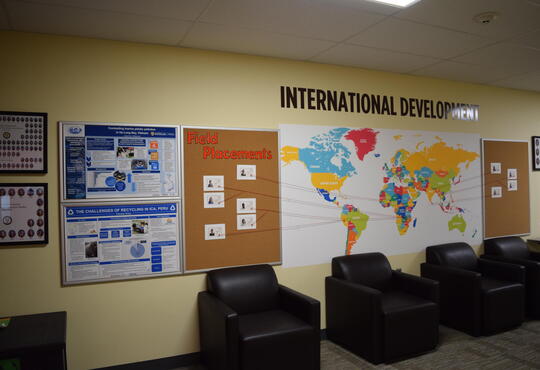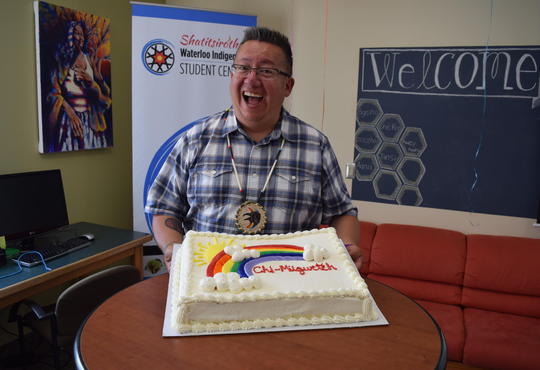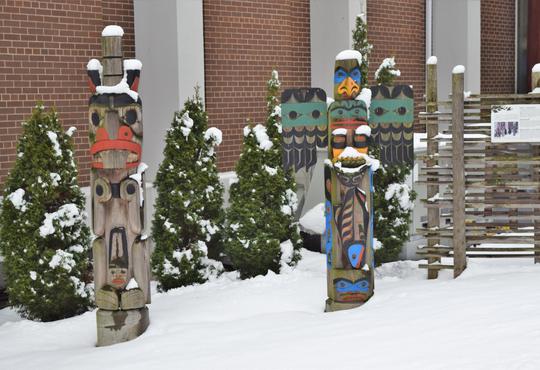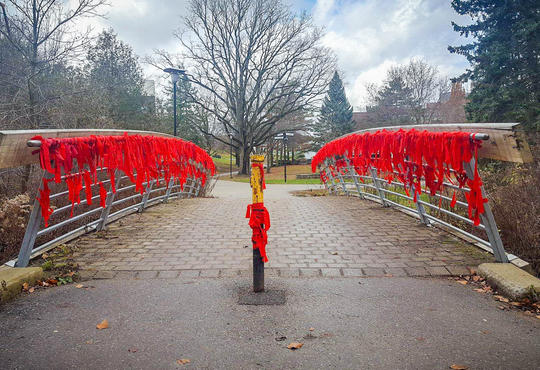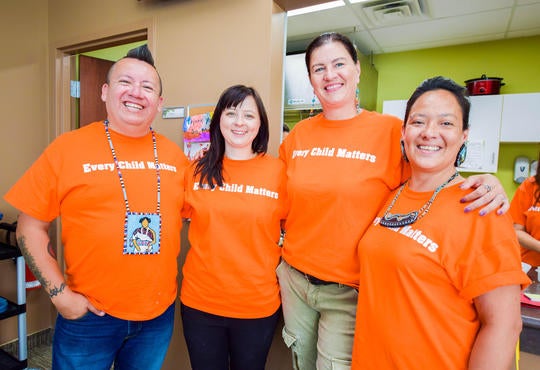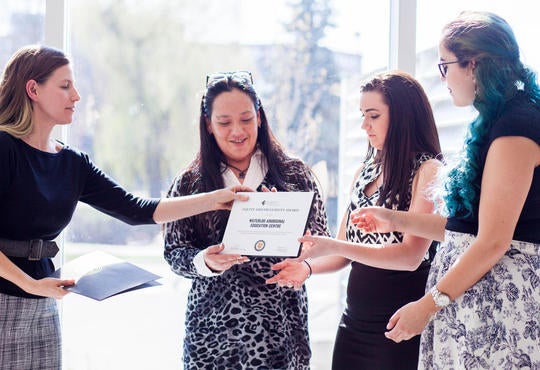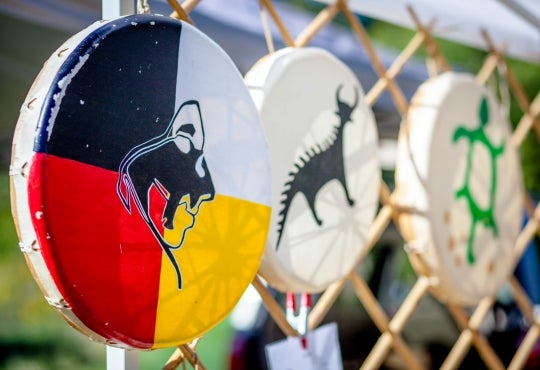Reconciliation and Indigenous Entrepreneurship, a major focus of TEDxKitchenerED
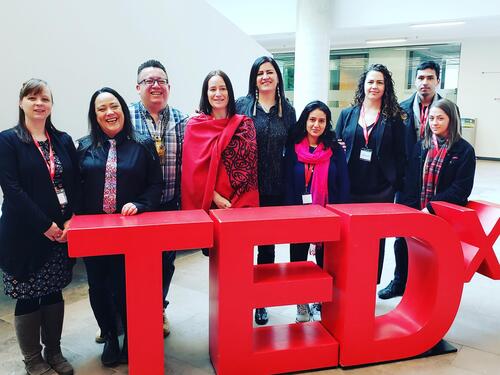
On February 22, fascinating and engaging presenters hit the stage to share their passions and discuss their visions for the world at TEDxKitchenerED.
Of the 11 presenters, one was our very own Lori Campbell, director of Waterloo Indigenous Student Centre (WISC) and another was Max Kakekagumick, a high school student from Fort Hope, Ontario, who participated in the first Leadership Entrepreneurship and DesignThinking (LEAD) camp offered by St. Paul’s last May.
Campbell gave a timely, powerful talk, entitled Reconciliation is Dead. While the title speaks to the current politicized views on reconciliation, Campbell explains that “reconciliation isn’t dead, unless you choose to let it die”.
With her track record as an Indigenous leader in education, it’s no surprise Campbell was chosen to speak out of hundreds of applicants. She has made it her mission to advocate for social justice and advance the processes of Indigenization and reconciliation. Her talk focuses on how reconciliation can be done on a small, yet impactful scale, while also acknowledging what does not contribute to successful reconciliation.
To Campbell, reconciliation is, “what you do at your dinner table. It’s the conversations you have with your families when you’re watching the evening news. It’s providing your children with the right knowledge so that they can respectfully get along and play with Indigenous children”.
Within the St. Paul’s community, Campbell continually works with her team at WISC to amplify the voices of Indigenous students and youth while providing a safe space for learning and development.
Kakekagumick was one of 17 high school students to recently experience the impact of WISC, by attending the LEAD camp with Indigenous youth from across Ontario. His team won the LEAD pitch contest, which took place at the Google Canada office in Kitchener. Following the camp, Kakekagumick was encouraged by staff at Google and WISC to consider speaking at TEDxKitchenerED.
For Kakekagumick, “the best part about LEAD, was that we learned to look at a problem creatively and find a solution, humanely.”
In his talk, Us and the Rez Dogs, Kakekagumick discusses being a victim of a dog attack and how this issue spans across Indigenous communities.
“These wild dogs often start as cute puppy pets but then get abandoned later in their life. Once in the wild, they start reproducing. So, while the problem starts with people abandoning their dogs, there’s another one that’s reproducing in the wild, uncontrolled,” explained Kakekagumick.
He finalizes his talk by presenting a four-step solution to address the health issues of canine overpopulation in these communities, with a solution for safe-breeding and a compelling case for government funding.
The second LEAD camp was scheduled to take place at Google Kitchener this May but has since been postponed due to the COVID-19 pandemic. St. Paul’s and the WISC team look forward to setting a new date and continuing to provide excellent opportunities for youth like Kakekagumick to explore entrepreneurship and design thinking, rooted in Indigenous knowledge and practice.
Lyle S. Hallman Foundation supports plans for new model of business education
We are proud to announce that the Lyle S. Hallman Foundation has granted St. Paul’s a total of $212,500 to support the second phase of our working plan to develop a new model of Indigenized business education.
St. Paul’s is working with several different partners to develop an academic program that is tailored to meet the needs of Indigenous students and their communities in both form and content. It will be grounded in four fundamental characteristics:
- Its focus will be entrepreneurship, rather than corporate business practice
- Its curriculum will be based on case studies drawn from Indigenous enterprises
- It will include technical content unique to Indigenous entrepreneurs, such as joint ventures, procurement policies, Indigenous economic development corporations, and tax and governance issues
- The program as a whole will be informed by Seven Generations Thinking. Seven Generations thinking is an Indigenous philosophical way of being in the world. This philosophy reminds us that every decision we make and everything we do should be thought of in context of the impact it will or may have on the seventh generation after us. The flip-side is also just as important. Seven generations ago, our ancestors were dreaming of us and making the best decisions that they could so that we could succeed and thrive.
Phase one has been taking place over the past few years, as staff in the Waterloo Indigenous Student Centre have incorporated a greater emphasis on leadership, entrepreneurship and design thinking into our camps for Indigenous youth. Camp participants learn about the long and proud history of Indigenous entrepreneurship and innovation while also forming teams to pitch entrepreneurial solutions to current social or environmental problems.
Phase two is underway. With the assistance of our friends at the Lyle S. Hallman Foundation we are hiring a case study developer to produce an inventory of uniquely Indigenous focused case studies which will form the underpinnings of future Indigenous business and entrepreneurship courses.
In the second part of phase two, a cohort of 12 Indigenous youth will take part in a two-part pilot program beginning next year which will include both in-classroom and work-integrated learning modules.
The third phase is to begin teaching eight courses in Indigenous entrepreneurship that will be offered as a minor and eventually grow to become a full major for students at Waterloo.
WPIRG Campus Legacy Award: for students, by students
The Waterloo Public Interest Research Group (WPIRG) was founded in 1973 with the mission of fostering and supporting University of Waterloo students and others to research, educate, and take action on environmental and social justice issues.
During a nearly 50-year legacy at Waterloo and the Affiliated and Federated Institutions, student members of WPIRG took action on countless issues and were particularly strong advocates and allies for Indigenous students.
In recognition of this long history, the current Board of WPIRG has established the WPIRG Campus Legacy Award for Indigenous Students to further enhance a legacy of cooperation, advocacy and social justice by providing annual awards available exclusively to Indigenous students who are working to advance causes related to social and or environmental change.
Beginning this fall, Waterloo Indigenous students can apply to receive awards of up to $1,000 to fund their travel to or participation in workshops, conferences, forums, demonstrations and other activities related to social justice and environmental action.
Indigenous alumni taking the lead
In recent years the staff in the Waterloo Indigenous Student Centre have invited many Indigenous leaders from all across Turtle Island to speak and engage with members of the campus community. Sylvia McAdam, Chief Wilton Littlechild, David A. Robertson, Tomson Highway, Lee Maracle, JP Gladu and Cindy Blackstock are just a few of the prominent leaders who have visited campus in recent years.
For our students, who are themselves aspiring leaders these speaking engagements can provide great inspiration. Today, our students can draw perhaps even greater inspiration from some Waterloo Alumni who are now truly among this country’s most prominent and inspiring Indigenous leaders.
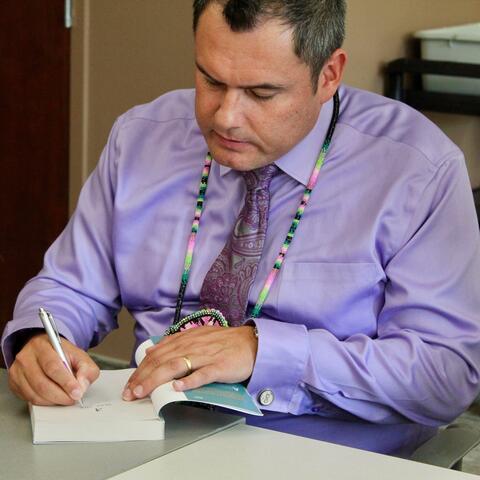 Jesse Thistle (MA ’17) is Métis-Cree from Prince Albert, Saskatchewan. He is completing his PhD at York University where he is also an assistant professor in Métis Studies and oh by the way, his memoir From the Ashes, is a #1 National Bestseller, finalist for the Kobo Emerging Writer Prize, finalist for CBC Canada Reads, finalist for Indigenous Voices Awards, a Globe and Mail book of the year, an Indigo book of the year and a CBC best Canadian nonfiction book of the year. Jesse is hailed by critics and readers alike for writing eloquently with fearlessness and honesty about how reconnecting with his family and his Indigenous roots helped him to overcome a painful, abusive and self-destructive past. Read more about Jesse’s story in the most recent Waterloo Magazine https://uwaterloo.ca/magazine/spring-2020/feature/indigenous-and-homeless-more-being-houseless Don’t forget to purchase your own copy of From the Ashes!
Jesse Thistle (MA ’17) is Métis-Cree from Prince Albert, Saskatchewan. He is completing his PhD at York University where he is also an assistant professor in Métis Studies and oh by the way, his memoir From the Ashes, is a #1 National Bestseller, finalist for the Kobo Emerging Writer Prize, finalist for CBC Canada Reads, finalist for Indigenous Voices Awards, a Globe and Mail book of the year, an Indigo book of the year and a CBC best Canadian nonfiction book of the year. Jesse is hailed by critics and readers alike for writing eloquently with fearlessness and honesty about how reconnecting with his family and his Indigenous roots helped him to overcome a painful, abusive and self-destructive past. Read more about Jesse’s story in the most recent Waterloo Magazine https://uwaterloo.ca/magazine/spring-2020/feature/indigenous-and-homeless-more-being-houseless Don’t forget to purchase your own copy of From the Ashes!
Tabatha Bull (BASc ’00) is Anishinaabe and a member of the Nipissing First Nation near North Bay. Earlier this spring, she was named President and CEO of the Canadian Council for Aboriginal Business, succeeding St. Paul’s Chancellor JP Gladu. Tabatha is at the helm of an organization which is leading the way to promote, strengthen and enhance a prosperous Indigenous economy. Not to mention it is an organization which will be an instrumental partner in our work to develop the Indigenous entrepreneurship minor. Tabatha has other connections to St. Paul’s as well, her sister Tracy Primeau is a proud Waterloo and St. Paul’s alumnus! Read more about Tabatha’s work and the impact of COVID-19 on Indigenous business in this great feature article in the most recent Waterloo Magazine https://uwaterloo.ca/magazine/spring-2020/feature/pandemic-impacts-indigenous-businesses-across-canada
Brad Regehr (BA ’93) is a member of the Peter Ballantyne Cree Nation in Saskatchewan and has been a partner with Maurice Law in Winnipeg since 2017 where he specializes in Aboriginal, commercial and property law. He is currently serving as the Vice-President of the Canadian Bar Association and on September 1, 2020 he will become the first Indigenous lawyer to be name President of the Canadian Bar Association. Read more about Brad and this important appointment here: https://www.nationalmagazine.ca/en-ca/articles/people/profiles/2019/meet-the-cba-s-new-vice-president
Congratulations Jesse, Tabatha and Brad!



